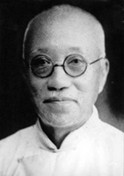Wu Leichuan on:
[Wikipedia]
[Google]
[Amazon]
 Wu Leichuan (; alt. ) (1870–1944) was a leading Chinese
Wu Leichuan (; alt. ) (1870–1944) was a leading Chinese
 Wu Leichuan (; alt. ) (1870–1944) was a leading Chinese
Wu Leichuan (; alt. ) (1870–1944) was a leading Chinese theologian
Theology is the study of religious belief from a religious perspective, with a focus on the nature of divinity. It is taught as an academic discipline, typically in universities and seminaries. It occupies itself with the unique content of ...
in the early 20th century and Chancellor of Yenching University
Yenching University () was a Private university, private research university in Beijing, China, from 1919 to 1952.
The university was formed out of the merger of four Christian colleges between the years 1915 and 1920. The term "Yenching" come ...
.
Biography
From his childhood, Wu poured his energy into mastering theConfucian
Confucianism, also known as Ruism or Ru classicism, is a system of thought and behavior originating in ancient China, and is variously described as a tradition, philosophy, religion, theory of government, or way of life. Founded by Confucius ...
classics and working his way up through the imperial examinations
The imperial examination was a civil service examination system in Imperial China administered for the purpose of selecting candidates for the state bureaucracy. The concept of choosing bureaucrats by merit rather than by birth started early i ...
, obtaining the level of Jìnshì (進士) in 1898 in Beijing after passing the metropolitan and imperial examinations. He converted to Christianity in 1915 and became Yenching University's first Chinese vice-president and chancellor between 1926 and 1934.
Confucianism and Christianity
During the Anti-Christian movement of the 1920s, Wu wrote prolifically in an attempt to fuse Christian theology with Confucian concepts. He argued that important Christian values hadConfucian
Confucianism, also known as Ruism or Ru classicism, is a system of thought and behavior originating in ancient China, and is variously described as a tradition, philosophy, religion, theory of government, or way of life. Founded by Confucius ...
counterparts: love as ren (仁), prayer with self-cultivation (修养), and Christmas as a time to celebrate the birthdays of Christ and Confucius
Confucius (; pinyin: ; ; ), born Kong Qiu (), was a Chinese philosopher of the Spring and Autumn period who is traditionally considered the paragon of Chinese sages. Much of the shared cultural heritage of the Sinosphere originates in the phil ...
. Wu also drew parallels between the Christian Bible and the Confucian Zhongyong, from the Genesis 2:7 creation account with Zhongyong chapter 1 to the Messiah of Isaiah 11:1-10 with the Zhongyong savior in chapter 31.
See also
* Protestant missions in China 1807-1953 * T. C. ChaoReferences
Further reading
* * {{DEFAULTSORT:Wu, Leichuan 1870 births 1944 deaths Presidents of Yenching University Converts to Protestantism Chinese Protestant religious leaders Chinese Christian theologians